Embark on a journey like no other with RV Travel! The First Steps to Start RV Travel adventures are easier than you think – join us on the open road!
RV travel is an exciting and adventurous way to explore new destinations and experience the freedom and flexibility of life on the road. Whether you’re a seasoned traveler or new to the RV lifestyle, you should take a few key steps to ensure a successful and enjoyable journey. In this article, we’ll guide you through the first steps of RV travel, from choosing the right RV to planning your itinerary and preparing for the road.
The First Steps to Start RV Travel Key Takeaways:
- RV travel offers freedom, flexibility, and the opportunity to explore new destinations.
- Research different types of RVs to find the one that suits your needs and travel style.
- Consider renting an RV before purchasing to experience RV life firsthand.
- Create a budget to keep track of expenses and plan your finances for life on the road.
- Before setting off on your journey, take the time to familiarize yourself with your RV and its features.
- Plan your itinerary, research RV campgrounds and destinations, and make reservations in advance.
- Prepare your RV for the road by performing necessary maintenance tasks and packing essential supplies.
- Stay safe by following RV travel safety tips and being prepared for emergencies.
- Embrace the RV lifestyle and enjoy the freedom and community of full-time RVing.
Why RV Travel is a Great Option for Adventurers
Are you a thrill-seeker, always seeking new adventures and the freedom to explore? If so, RV travel is the perfect option for you. With RV travel, you can experience the thrill of the open road while enjoying the comforts of home. It offers a unique opportunity to venture off the beaten path and discover hidden gems in nature.
RV travel is all about adventure. Whether you want to hike through majestic mountains, kayak in crystal clear lakes, or explore national parks, RV travel allows you to immerse yourself in nature like never before. It gives you the freedom to wake up to breathtaking views and find new destinations at your own pace.
One of the biggest advantages of RV travel is the flexibility it offers. You can change your plans on a whim and follow your sense of adventure. If you stumble upon a picturesque town or a stunning hiking trail, you can simply park your RV and explore. RV travel allows you to have complete control over your itinerary and go wherever your heart desires.
RV travel also provides a sense of freedom. It allows you to escape the constraints of everyday life and embrace a nomadic lifestyle. You can leave behind the stress and obligations of work and immerse yourself in the beauty of nature. With RV travel, you have the freedom to create your own schedule, explore at your own pace, and truly live life on your terms.
Embrace the Adventure of RV Travel
So, if you’re an adventurer at heart, RV travel is the perfect option for you. It combines the thrill of exploration with the comforts of home, offering an experience like no other. With the freedom and flexibility to roam wherever the road takes you, RV travel unlocks a world of adventure waiting to be discovered. So pack your bags, hit the road, and embark on an unforgettable journey of discovery and excitement.
Renting vs Buying an RV: Which is Right for You?
If you’re considering embarking on an RV travel adventure, one of the first decisions you’ll need is whether to rent or buy an RV. Both options have pros and cons, so it’s important to carefully consider your needs, budget, and travel preferences before deciding. Let’s look at the advantages and disadvantages of renting and buying an RV.
Renting an RV
Pros:
- Flexibility: Renting an RV allows you the freedom to choose a different type or size of RV for each trip, depending on the needs of your travel party and destination.
- Lower upfront cost: Renting an RV typically requires a smaller initial investment compared to buying, making it an attractive option for those who want to try RV travel without a significant financial commitment.
- No long-term maintenance: When you rent an RV, you don’t have to worry about ongoing maintenance and repair costs, as these responsibilities typically fall on the rental company.
Cons:
- Higher overall cost: While renting may have a lower upfront cost, it can be more expensive in the long run, especially if you plan to take multiple trips or travel frequently.
- Limited customization: When renting, you have limited control over the features, layout, and furnishings of the RV, as you’ll be using a standard rental model.
- Availability: Depending on the time of year and popular travel destinations, RV rentals may be in high demand, making it challenging to secure your preferred rental dates and locations.
Buying an RV
Pros:
- Ownership and customization: When you buy an RV, you have the freedom to personalize and modify it to suit your specific needs and preferences, creating a home away from home.
- Cost savings in the long run: While buying an RV comes with a higher upfront cost, it can lead to cost savings over time, especially if you plan to use your RV frequently or for extended periods.
- Familiarity: Owning an RV allows you to become familiar with all its features, operations, and maintenance requirements, making each trip more convenient and comfortable.
Cons:
- Higher upfront cost: Buying an RV requires a significant initial investment, including the purchase price, insurance, and other related expenses.
- Ongoing maintenance and repairs: As an RV owner, you’re responsible for the regular upkeep, maintenance, and repairs of the vehicle, which can add to your overall costs.
- Depreciation: Like any vehicle, RVs depreciate over time, which means the value of your investment may decrease.
Ultimately, the decision to rent or buy an RV depends on your personal circumstances, travel preferences, and financial situation. If you’re new to RV travel or want flexibility and convenience, renting may be the best option for you. On the other hand, if you’re a frequent traveler or prefer the idea of personalizing your own space, buying an RV can provide a sense of ownership and long-term savings. Consider your priorities and weigh the pros and cons before making your choice.
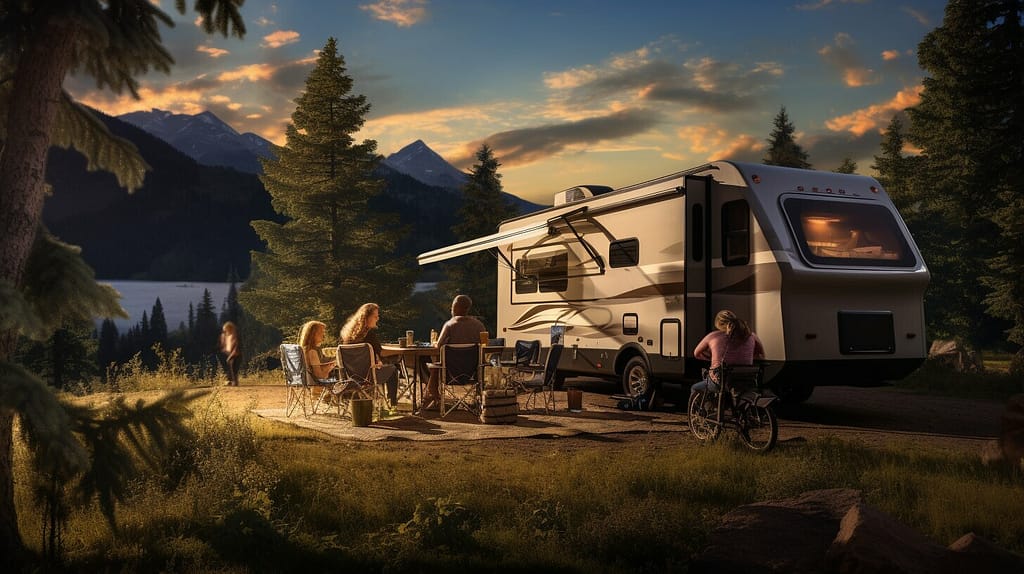
Choosing the Right Type of RV for Your Needs
When it comes to RV travel, choosing the right type of RV is essential to ensure a comfortable and enjoyable journey. With a wide variety of options available, ranging from motorhomes to trailers, it’s important to understand the different types of RVs and determine which one best suits your needs.
The Different Types of RVs
1. Motorhomes: Motorhomes are self-contained RVs that are built on a motorized chassis. They come in three classes: Class A, Class B, and Class C. Class A motorhomes are the largest and most luxurious, providing ample living space and amenities. Class B motorhomes, also known as camper vans, are smaller and more compact, making them easier to maneuver. Class C motorhomes offer a balance between the two, providing comfortable living space while still being manageable on the road.
2. Trailers: Trailers are towable RVs that are hauled behind a separate vehicle. They come in various types, including travel trailers, fifth wheels, and toy haulers. Travel trailers are the most common type and offer a range of sizes and floor plans. Fifth wheels are larger and require a special hitch that is mounted in the bed of a pickup truck. Toy haulers are designed to carry recreational vehicles like ATVs or motorcycles, with a garage space at the back of the trailer.
Choosing the Right RV for You
When deciding which type of RV is right for you, there are a few factors to consider:
- Size and Space: Determine how much living space you need and how many people will be traveling with you. Consider factors like sleeping arrangements, storage space, and overall comfort.
- Driving and Maneuverability: If you’re not comfortable driving a large vehicle, a smaller motorhome or towable RV may be a better option for you.
- Travel Style: Think about the type of travel you plan to do. If you prefer to stay in one place for extended periods, a larger motorhome or fifth wheel may be more suitable. If you want to explore off-grid or remote areas, a smaller, more agile RV may be preferable.
- Budget: RVs vary in price, so it’s important to determine your budget and find an RV that fits within your financial means.
Ultimately, the best RV for you is the one that meets your specific needs and travel preferences. It may take some time and research to find the perfect fit, but once you do, you’ll be ready to hit the road and embark on your RV travel adventure.
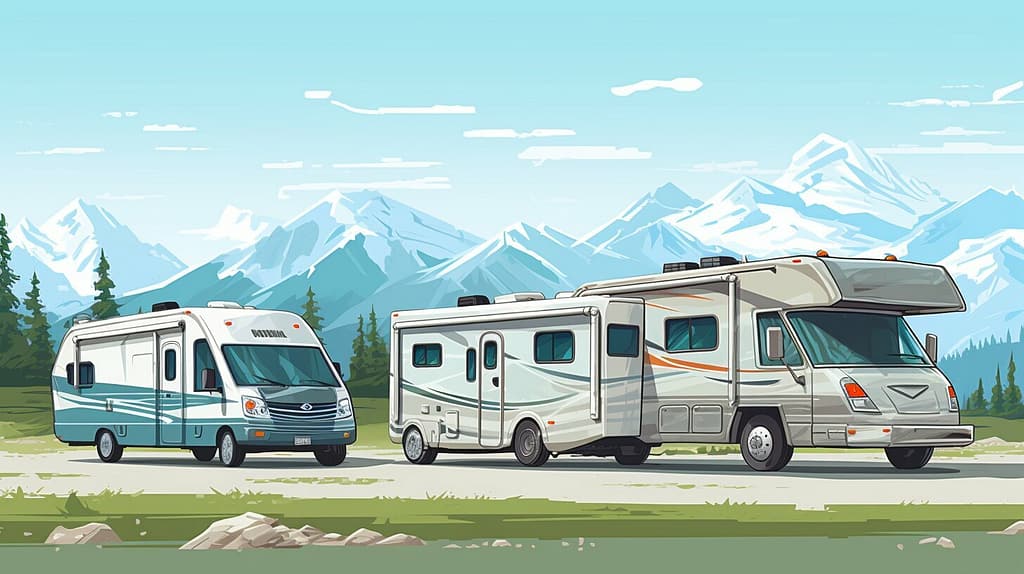
Choosing the right type of RV is a crucial step in ensuring a successful and enjoyable RV travel experience. By understanding the different types of RVs available and considering your specific needs, you can find the perfect RV that will provide you with the comfort, convenience, and freedom to explore the open road.
Essential RV Travel Tips for Beginners
If you’re new to RVing, you may feel overwhelmed by the amount of information out there. But don’t worry, we’ve got you covered with these essential RV travel tips for beginners. Whether you’re planning a short road trip or embarking on a full-time RVing adventure, these tips will help you get started and make the most of your RV travel experience.
1. Do Your Research
Before hitting the road, take the time to research RV travel. Learn about different types of RVs, such as motorhomes, trailers, and camper vans, and determine which one best suits your needs and preferences. Familiarize yourself with RV terminology, campground etiquette, and safety precautions. Additionally, research RV travel destinations and create an itinerary to ensure a smooth and enjoyable trip.
2. Prioritize Safety and Maintenance
Safety should be a top priority when RVing. Before each trip, check your RV’s tires, brakes, lights, and fluids to ensure they are in good working condition. Familiarize yourself with safe driving practices for RVs, such as allowing for extra stopping distance and making wide turns. Invest in RV-specific safety equipment, such as a fire extinguisher and carbon monoxide detector. Regularly maintain your RV’s systems, including the electrical, plumbing, and propane systems, to prevent breakdowns and ensure a comfortable journey.
3. Pack Smart and Efficiently
When it comes to packing for RV travel, less is more. Stick to the essentials and avoid overpacking. Make a checklist of must-have items, such as bedding, kitchen utensils, toiletries, and outdoor gear. Utilize space-saving storage solutions, such as collapsible containers and vacuum-sealed bags. Consider the weight distribution in your RV and avoid overloading one side. Keep important documents, such as insurance and registration papers, easily accessible. And don’t forget to pack emergency supplies, including a first aid kit, roadside assistance kit, and extra food and water.
RV travel is a fantastic way to explore the world while enjoying the comforts of home on wheels. With these essential RV travel tips for beginners, you’ll be well-prepared to embark on your RV adventure. Remember to research, prioritize safety and maintenance, and pack smart to ensure a smooth and enjoyable journey. Happy RVing!
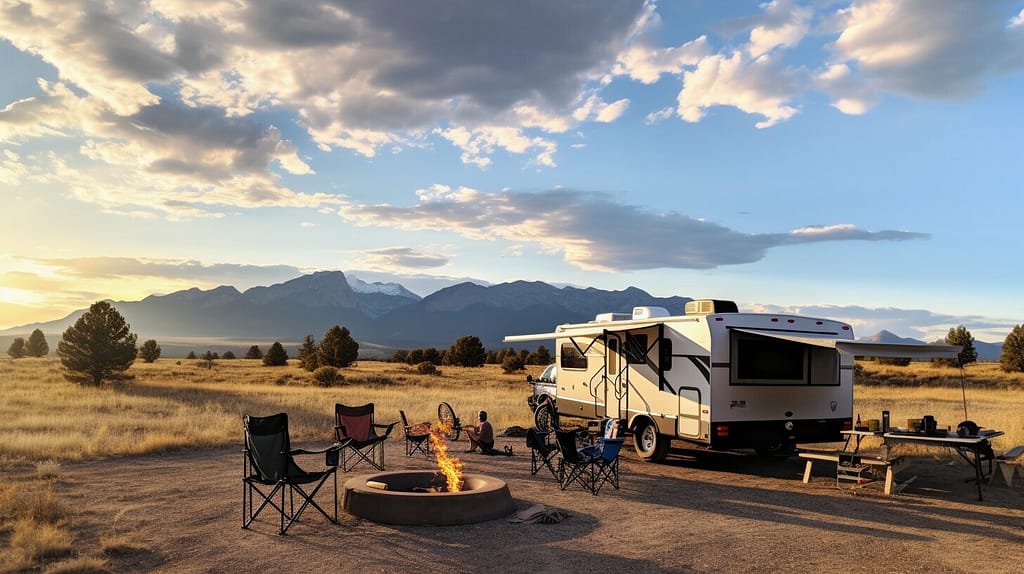
Planning Your RV Travel Adventure
Planning your RV travel adventure is an exciting part of becoming an RVer. It allows you to map out your journey, choose destinations that align with your interests, and create an itinerary that suits your travel style. Whether you’re a spontaneous traveler or prefer a more structured approach, having a plan in place can ensure that you make the most of your RV experience.
Create an Itinerary
Start by creating an itinerary for your RV travel adventure. Consider the duration of your trip and the destinations you want to visit. Research different RV parks and campgrounds along your route, and make reservations in advance to secure your spot. This will help you avoid any last-minute disappointments and allow you to plan your travel days accordingly. Be sure to include both travel days and rest days in your itinerary to give yourself time to relax and explore each destination.
Choose Your Destinations
When planning your RV travel adventure, think about the type of destinations that interest you. Are you drawn to national parks, coastal towns, or bustling cities? Consider the activities and attractions that each destination has to offer and choose ones that align with your interests. Research the RV camping options available in each location and determine if they meet your needs in terms of amenities, accessibility, and proximity to attractions.
Map out Your Routes
Mapping out your routes is an essential part of planning your RV travel adventure. Use a GPS or a navigation app specifically designed for RVers to determine the best roads to take based on your RV’s size and weight restrictions. Consider scenic routes and detours that allow you to explore interesting places along the way. Be flexible with your routes and be prepared for unexpected road conditions or changes in your plans.
By taking the time to plan your RV travel adventure, you can ensure a smooth and enjoyable journey. From creating an itinerary and choosing destinations to mapping out your routes, careful planning will help you make the most of your RV experience. So get ready to hit the road, explore new places, and make unforgettable memories in your RV!
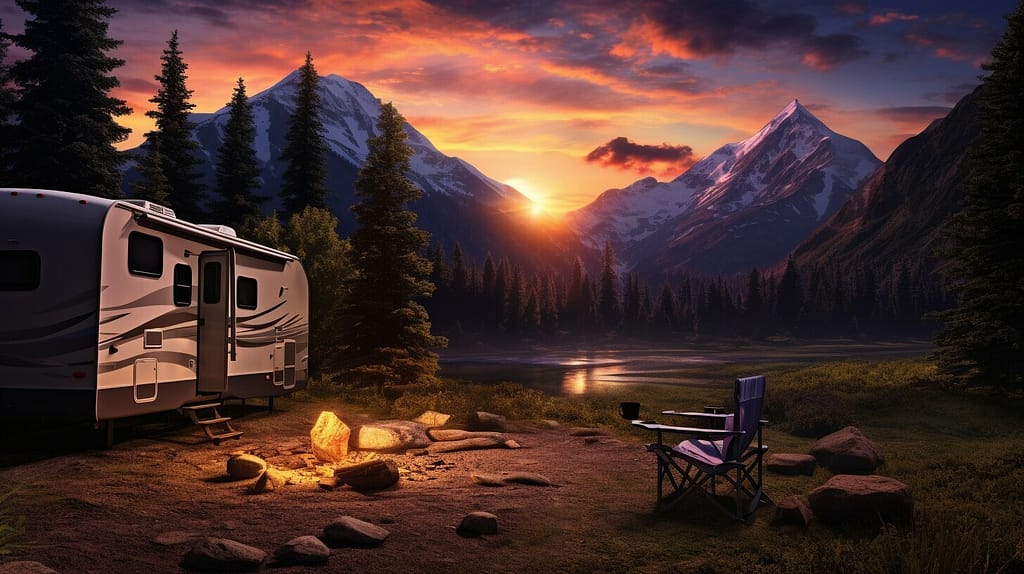
Preparing Your RV for the Road
Before hitting the road in your RV, it’s crucial to make sure your vehicle is properly prepared. Taking the time to prepare your RV will not only ensure a smoother and more enjoyable travel experience but also help prevent any potential issues or breakdowns along the way. Here are some essential tips for preparing your RV for the road:
- Create a Checklist: Having a checklist is essential to ensure you don’t forget any important tasks. The checklist should include items such as checking the tires and pressure, inspecting the brakes, testing all the lights, checking the battery, and inspecting the RV’s exterior and interior for any damages or leaks.
- Pack Smart: When it comes to RVing, packing efficiently and smartly is crucial. Make a list of all the essential items you’ll need for your trip, including camping gear, kitchen supplies, toiletries, and clothing. Organize your belongings and pack them in a way that maximizes space and ensures everything is secure while driving.
- Stock Up on Supplies: Before hitting the road, make sure you have all the necessary supplies for your journey. This includes items such as food, water, propane, cleaning supplies, and toiletries. It’s also a good idea to stock up on spare parts and tools that may come in handy for any RV maintenance or repairs.
- Perform Routine Maintenance: Regular maintenance is key to keeping your RV in good condition. Before setting off, check the oil, coolant, and fluid levels in your RV’s engine. Inspect the belts, hoses, and filters for any signs of wear or damage. It’s also important to clean and sanitize the freshwater and wastewater systems and check the RV’s electrical and plumbing systems.
- Secure Loose Items: While on the road, your RV will be subjected to vibrations and movements. To prevent any damage or accidents, make sure to secure all loose items inside your RV. This includes items such as dishes, electronics, and furniture. Use Velcro, bungee cords, or storage bins to keep everything in place.
- Check for Safety: Safety should always be a top priority when RVing. Check that your smoke detectors, carbon monoxide detectors, and fire extinguishers are in good working condition. Make sure you have a first aid kit on board and familiarize yourself with basic first aid procedures. It’s also important to have a safety plan in case of emergencies and know how to properly use your RV’s emergency equipment.
By following these tips and properly preparing your RV for the road, you’ll be able to enjoy a safe and hassle-free travel experience. Remember, regular maintenance and thorough preparation are key to ensuring your RV is ready for any adventure that lies ahead.
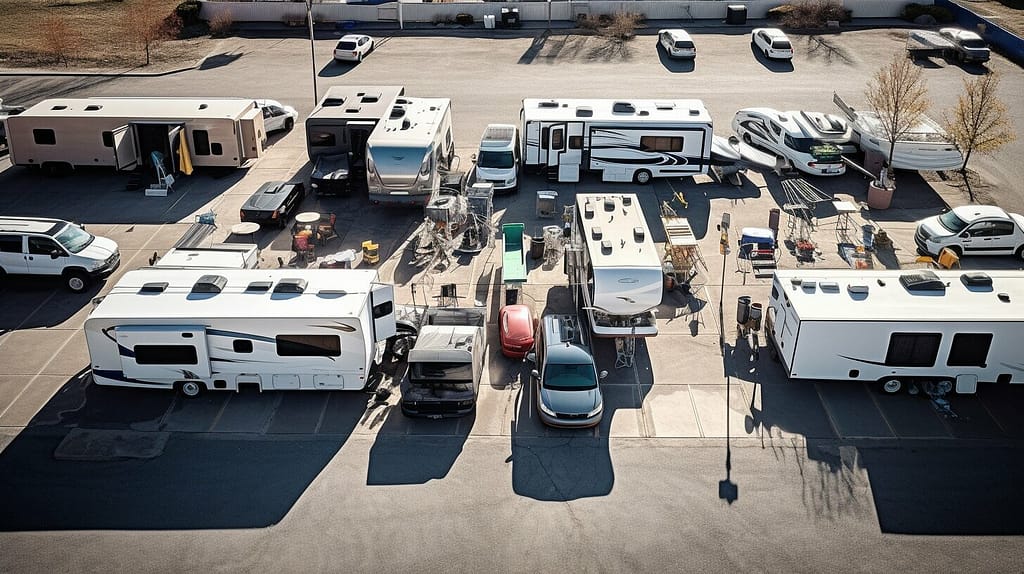
Navigating RV Campgrounds and Travel Destinations
When it comes to RV travel, one of the most exciting aspects is exploring different campgrounds and travel destinations. Whether you’re looking for a peaceful retreat in nature or a bustling city with plenty of attractions, there are RV travel destinations to suit every preference. To help you make the most of your RV adventure, here are some tips on navigating RV campgrounds and finding the perfect travel destinations.
RV Travel Destinations
First, let’s talk about RV travel destinations. The beauty of RV travel is that it allows you to go wherever your heart desires. Whether you want to explore national parks, visit beachside towns, or immerse yourself in the charm of small towns, there are countless destinations to choose from. Make a list of places you’ve always wanted to visit and prioritize them based on your preferences and interests.
Researching RV travel destinations is an essential step in planning your trip. Look for campgrounds and RV parks in your desired destinations and take note of their amenities, proximity to attractions, and availability. Online resources such as RV park reviews and travel forums can provide valuable insights from fellow RV travelers, helping you make informed decisions about where to stay.
Campground Amenities
When choosing a campground, consider the amenities they offer. Some campgrounds provide full-hookup sites with electricity, water, and sewer connections, while others may offer more primitive camping experiences. Depending on your needs and preferences, you may want to look for campgrounds with amenities such as Wi-Fi, laundry facilities, swimming pools, playgrounds, and social activities.
RV park reviews can give you a good idea of the quality and cleanliness of different campgrounds. Look for reviews that mention the condition of the sites, the friendliness of the staff, and the overall experience of other RV travelers. This will help you find campgrounds that provide a comfortable and enjoyable stay.
RV Travel Resources
Lastly, it’s important to utilize RV travel resources to enhance your RV experience. There are many online platforms and apps dedicated to RV travel, providing valuable information and resources for RVers. These resources can help you plan your routes, find RV-friendly attractions, locate dump stations, and even connect with other RV travelers.
Some popular RV travel resources include websites like RV Trip Wizard, Campendium, and AllStays, as well as apps like RV Parky and iOverlander. These tools can make it easier to find campgrounds, locate services, and discover hidden gems along your route. Take advantage of these resources to make your RV travel adventure smooth and memorable.
So, whether you’re seeking relaxation in nature or an adventure in a new city, navigating RV campgrounds and travel destinations is an exciting part of the RV lifestyle. By researching destinations, considering campground amenities, and utilizing travel resources, you can plan a memorable and enjoyable RV travel experience. Happy travels!
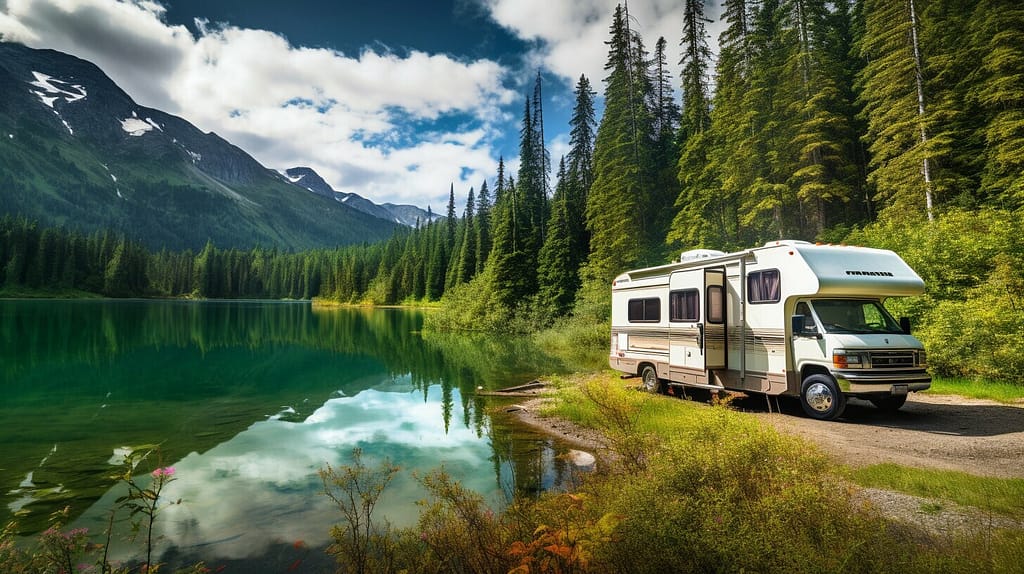
Budgeting for RV Travel
When it comes to RV travel, budgeting is a crucial aspect to consider. Planning your finances and estimating expenses will help you stay on track and make the most of your RV adventure. Here are some practical tips for budgeting for RV travel:
- Calculate your expenses: Start by determining your fixed costs, such as insurance, registration fees, and monthly loan payments if you have financed your RV purchase. Next, consider variable costs like campground fees, fuel, food, and entertainment. It’s important to have a clear understanding of your monthly expenses to create an accurate budget.
- Track your spending: Keep a record of your expenses while on the road. This will help you identify any areas where you may be overspending and allow you to make necessary adjustments. Use budgeting apps or spreadsheets to track your spending and stay organized.
- Save money on the road: Look for ways to cut costs and save money during your RV travels. Consider cooking your own meals instead of eating out, boondocking or staying at free or low-cost campgrounds, and taking advantage of discounted attractions and activities. Additionally, plan your routes efficiently to save on fuel expenses.
- Plan for unexpected expenses: It’s important to have a contingency fund for unexpected expenses that may arise during your RV travels. This could include emergency repairs, medical expenses, or unexpected campground fees. Having savings set aside for these situations will give you peace of mind and prevent financial stress.
Conclusion
Budgeting for RV travel is essential for a successful and enjoyable journey. By calculating your expenses, tracking your spending, finding ways to save money, and planning for unexpected costs, you can make the most of your RV adventure without breaking the bank. Remember, a well-planned budget will allow you to focus on the experiences and adventures that await you on the open road. Happy RV travels!
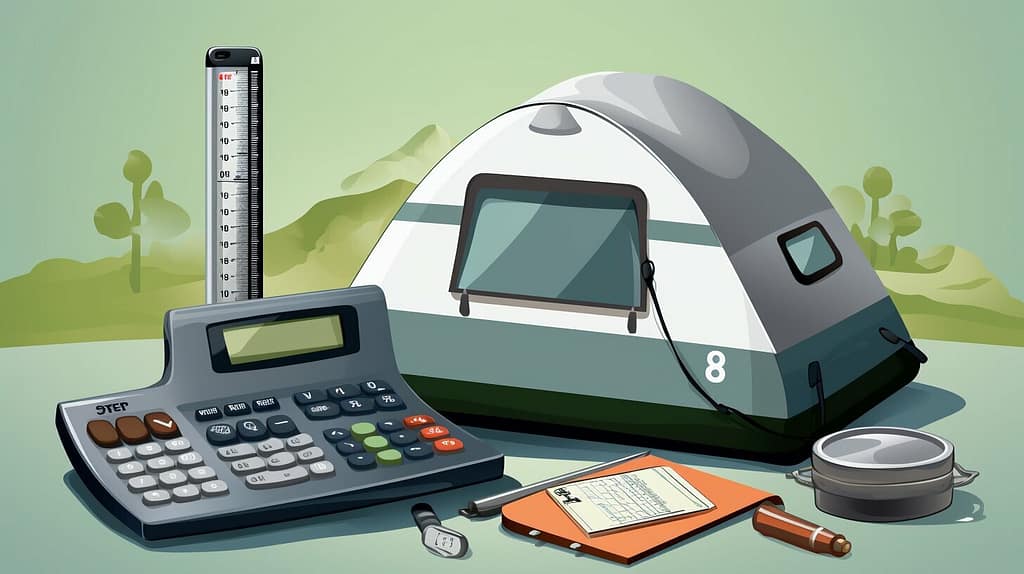
Embracing the RV Lifestyle: Tips for Full-time RVers
Are you ready to dive into the full-time RVing lifestyle? It’s an exciting and adventurous way to live, offering the freedom to explore new places, embrace the outdoors, and connect with a vibrant community of fellow RVers. But before you hit the road, there are a few important tips to keep in mind.
- Downsizing: When transitioning to full-time RVing, downsizing is key. Consider what items are essential and let go of the rest. Simplify your life and only bring what you truly need and love.
- Remote Work: Embracing the RV lifestyle often means finding remote work opportunities. With the rise of digital nomadism, there are more options than ever before. Explore online jobs, freelance work, or starting your own remote business to sustain your life on the road.
- Connecting with the Community: One of the greatest aspects of RVing is the sense of community. Attend RV gatherings, join online forums or social media groups, and connect with fellow RVers. They can offer valuable advice, travel tips, and a sense of camaraderie.
As you embark on your full-time RVing journey, keep in mind that flexibility is key. Embrace the unexpected, be open to new experiences, and don’t be afraid to veer off the beaten path. The RV lifestyle offers endless opportunities for adventure and self-discovery. So pack your sense of adventure, hit the road, and get ready to create memories that will last a lifetime.
Embrace the RV Lifestyle and Live Your Dreams
Embracing the RV lifestyle opens up a world of possibilities. You have the freedom to travel at your own pace, explore new destinations, and create a home wherever you go. Whether you’re a nature lover, a thrill-seeker, or simply crave the freedom of the open road, full-time RVing offers the chance to live life on your terms.
So, take the leap, embrace the RV lifestyle, and embark on the adventure of a lifetime. Whether you’re seeking solitude in the mountains, sunsets on the beach, or the thrill of city life, there’s an RVing experience waiting for you. With careful planning, a sense of adventure, and a spirit of community, you can create a life filled with unforgettable moments and endless exploration.
RV Travel Safety Tips
When it comes to RV travel, safety should always be a top priority. Whether you’re a seasoned RVer or just starting out on your adventures, taking precautions is important to ensure a safe and enjoyable trip. Here are some essential RV travel safety tips to keep in mind:
- Practice safe driving: RVs are larger and heavier than regular vehicles, so driving cautiously is important. Take the time to familiarize yourself with your RV’s size and handling characteristics. Keep safe from other vehicles, use your turn signals, and be mindful of blind spots. Remember to adjust your speed in different weather conditions and be extra cautious on winding and steep roads.
- Secure your belongings: While traveling, make sure all your belongings are properly secured. This includes securing loose items inside the RV to prevent them from falling or shifting during transit. Double-check that all doors, windows, and hatches are securely closed and locked before hitting the road.
- Be prepared for emergencies: It’s essential to have an emergency plan in place. Make sure you have a first-aid kit on board and know how to use it. Familiarize yourself with the location of emergency exits and fire extinguishers in your RV. It’s also a good idea to have a roadside assistance membership and carry a spare tire and necessary tools for changing it.
- Practice campground safety: When staying at a campground, be aware of your surroundings and follow any posted rules and regulations. Lock your RV when you’re away and keep valuables out of sight. Be cautious of strangers and trust your instincts. It’s also important to follow proper campground etiquette, such as keeping noise levels down during quiet hours and properly disposing of trash.
By following these RV travel safety tips, you can help ensure a safe and enjoyable journey on the road. Remember, safety should always be a priority, so take the necessary precautions and enjoy your RV travel adventures with peace of mind.
The First Steps to Start RV Travel – Conclusion
RV travel offers an exciting and unique way to explore the world, and with the right preparation and knowledge, anyone can embark on their RV travel adventure with confidence. Whether you decide to rent or buy an RV, it’s important to research different types of RVs and choose one that suits your needs and travel style. Taking an RV vacation before making a purchase can give you a taste of the RV life and help you determine the best fit for you.
Before hitting the road, it’s essential to familiarize yourself with your RV and its features. This includes understanding how to operate the various systems, such as the A/C, heating, and electrical systems, as well as how to empty and fill the tanks. Creating a budget and cutting down on personal items can help you better manage your expenses and make the transition to RV life smoother.
Planning and researching your RV travel adventure is key to a successful trip. This includes creating an itinerary, choosing destinations, and making campground reservations. It’s also important to have essential tools and supplies on hand, such as a backup camera, outdoor mats, chairs, and storage containers for pet food. Safety should always be a priority, so make sure to follow RV travel safety tips and be prepared for emergencies on the road.
RV travel is a flexible and rewarding lifestyle, and embracing the RV community can enhance your experience. Consider connecting with other RVers, both online and at campgrounds, to share tips, stories, and resources. As you embark on your RV travel adventure, remember to have fun, be open to new experiences, and enjoy the freedom and flexibility that RV travel offers.
The First Steps to Start RV Travel FAQs
Q: What are the first steps to start RV travel?
A: The first steps to start RV travel include considering whether to rent or buy an RV, researching different types of RVs, cutting down personal items, making a budget, and allowing for a transition period.
Q: Why is RV travel a great option for adventurers?
A: RV travel is a great option for adventurers because it offers freedom, flexibility, and the ability to explore new destinations. It allows adventurers to have their accommodations on wheels and easily change their travel plans on the go.
Q: What are the pros and cons of renting vs buying an RV?
A: Renting an RV provides flexibility and allows for trying out the RV lifestyle without a long-term commitment, but it can be expensive in the long run. Buying an RV gives you the freedom to customize it to your needs, but it requires a larger upfront investment.
Q: What types of RVs are available?
A: There are various types of RVs available, including motorhomes (Class A, Class B, and Class C), trailers (fifth wheels, travel trailers, and toy haulers), and towable RVs (truck campers and pop-up campers).
Q: What are essential tips for beginner RV travelers?
A: Essential tips for beginner RV travelers include learning how to operate and maintain the RV, ensuring safety on the road, packing necessary supplies and tools, and familiarizing yourself with campground etiquette and RV park rules.
Q: How can I plan my RV travel adventure?
A: Planning an RV travel adventure involves creating an itinerary, researching destinations, mapping out routes, making campground reservations, and considering factors like budget, activities, and attractions.
Q: How do I prepare my RV for the road?
A: To prepare an RV for the road, create a checklist of essential tasks such as checking the tires, engine, and fluid levels, stocking up on necessary supplies, packing personal belongings, and performing regular maintenance checks.
Q: What resources can help me navigate RV campgrounds and travel destinations?
A: Resources such as RV travel websites, campground directories, online reviews, and RV travel communities can help you find and navigate RV campgrounds and travel destinations effectively.
Q: How can I budget for RV travel?
A: Budgeting for RV travel involves estimating expenses for fuel, campground fees, food, activities, and maintenance. It’s important to track spending, look for ways to save money on the road, and adjust the budget as needed.
Q: What tips are there for embracing the full-time RV lifestyle?
A: Tips for embracing the full-time RV lifestyle include downsizing personal belongings, finding remote work opportunities, connecting with the RVing community, and embracing the freedom and flexibility of living on the road.
Q: What safety tips should I follow for RV travel?
A: Safety tips for RV travel include practicing safe driving habits, securing the RV properly, being prepared for emergencies, and taking precautions to protect yourself and your belongings while on the road.
